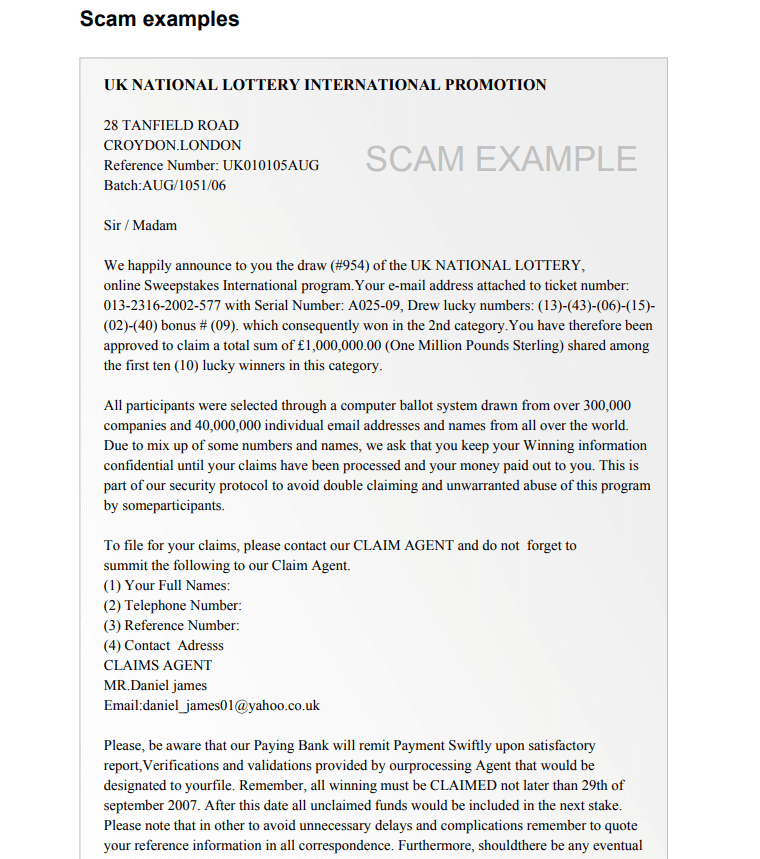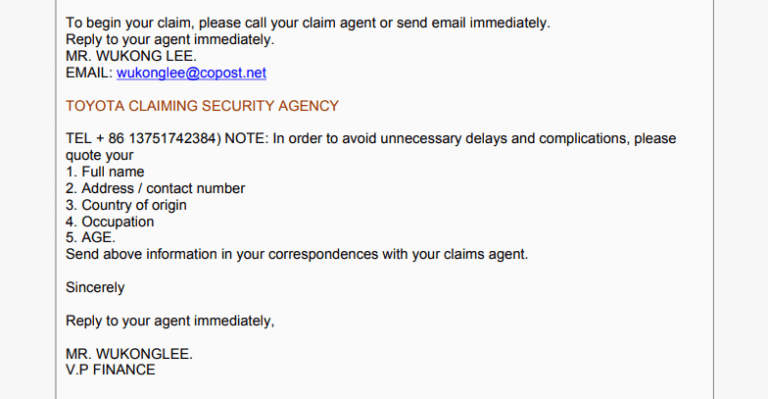An online lottery scam is when someone abuses the lotto system to try and extort money or sensitive data from you. That data can include personal and financial or bank account information to access your bank accounts, or they might try to make you send them the money yourself. Or they may tell them to fulfil some weird conditions before you can get your prize money.
That is why lottery players should always be on the lookout for potential scams. We will talk about how you can protect yourself in this article. In this article, we are focusing on online lottery scams and everything you should know about them. Apart from covering the basics, we will go through the warning signs and tips on avoiding scams!
- If you’re told you’ve won a lottery you didn’t enter, it’s likely a scam. Ignore it.
- Never share personal or financial information with anyone claiming to be a lottery official.
- If you’re unsure about the legitimacy of a lottery, research it online.
- Discover the sneaky tricks lottery scammers use to take advantage of unsuspecting victims and learn how to protect yourself from falling into their trap.
- Contact the official website or customer service of the lottery organization to verify if you’ve truly won a prize
- If you suspect an online lottery scam, report it to the Federal Trade Commission (FTC), or the appropriate agency in your country.
Contents
Tips to Avoid an Online Lottery Scam
It’s always better to be safe than sorry, and that rule also applies to lottery scams. Take a look at expert tips that should help you avoid scams in the online lotto world!
1. You Can’t Win Lottery If You Didn’t Buy a Ticket
There is a famous joke about a guy who had been praying for years to win the lottery jackpot. He prayed every night for years until God sent him a message, “you need to buy a ticket first!”
Source: SRA
You can’t expect to win anything if you didn’t purchase a ticket. That should be the first sign that someone is trying to scam you. The lottery might be familiar to you, such as the US Powerball. You might even play it occasionally, but you know that you missed buying the tickets for the last draw. If you don’t have active tickets, the odds are you are not the winner, but a scam victim.
2. They Are Asking for Upfront Fees When Claiming the Prize
Lotteries never work that way. If anyone asks you to pay for something to receive another thing in return, don’t do it. Many scammers send you an email where they tell you to pay $100 so that they can send you a winning lottery ticket of $10,000. But as soon as you send the money, you will never hear from them again.
Source: SRA
This is a tactic that the scammers have used for years. You might have heard about the famous Nigerian scams with the money that your distant cousin left you in a will trapped in a bank overseas. A similar concept is applied to the lottery. A legit online lottery provider will never ask you for money to release a reward.
3. Checks Can Be Fake – Here Is How to Confirm
Although they are not as popular as before, checks are still present as a transaction method. You might receive a prize check that you allegedly won in the lottery or sweepstakes. The check might involve rewiring back to them a small portion of the winning amount.
Once you head to the bank, they might even issue the money because it takes weeks to discover the check is a fraud. However, you don’t get your money back, and the bank doesn’t compensate for the losses because the check you used is fake.
Here are some ways how you can confirm the check is fake:
- Call the bank – never use the number provided in the e-mail because it might be a part of the scam. Instead, check out which bank allegedly issued the check, and find the contact phone on their official website.
- Visit the bank – if there is a local branch of that bank, you can also visit it.
- Check the lottery rules – you can visit the lotto website and see if sending rewards via check is according to their rules.
- Analyze all details on the check – more often than not, the scammers might make typos or have some inconsistencies compared to a legit check.
4. The E-Mail Address Reveals the Scammer
Here is one of the bulletproof ways to reveal the scammer – check out the e-mail address sending you the prize notification. If you get an e-mail from the lottery, it will always be sent from their official domain. The same applies to the best online lottery websites. For example, if The Lotter sends you an e-mail, you will always receive it from an address like “[email protected].”
Source: Colorado Lottery
Scammers might try to replicate this address, so make sure to examine the domain closely. They might use “[email protected]” or anything like that. However, if the domain isn’t identical to the official one, you can be pretty sure that it is a scam.
5. Look for Typos and Unprofessionalism
Another red flag is the presence of typological errors in the email, or when the email has an unprofessional tone. The organizers of the top lottery sites like EuroMillions are highly professional and communicate with players with the utmost professionalism. They don’t make errors in their messages. They are reputable companies with many years in the industry, so grammar errors in emails and letters are near impossible.
Check out the example below.
Source: RIPANDSCAM
The example above is a scam. This is why you want to check for typos and other signs of unprofessionalism in the email. It might be that they used different fonts, made spelling errors, didn’t type your name right, etc. If anything sounds or looks weird, it should be a warning sign of a scam.
6. Bonus Tip: Always Stick to Reputable Online Lottery Sites
The best way to avoid any foul play is to purchase lottery tickets online via reputable providers. You can choose from a long list of excellent sites, such as Lotto Agent, LottoSmile, and WinTrillions. These operators allow you to buy tickets for many national and transnational lotteries in a single place.
Alternatively, you can also buy tickets from the official website of the organization. That is another way to be certain that nobody would steal away your prize.
How to Identify an Online Lottery Scam – Warning Signs
Although the scammers are going the extra mile to trick you, this section will teach you how to identify an online lottery scam. Here are some warning signs to consider:
- Somebody offers you to purchase a lottery ticket with a guaranteed win. Always remember no one can promise you any winnings because lotto is a luck-based game.
- You are the winner chosen by “random,” and they claim the offer is “legit.” If you didn’t participate in a contest, you can’t win it. It is as simple as that.
- You need to pay something upfront. Whether it is purchasing a ticket or paying alleged taxes, never pay anything before getting your prize.
- They are asking you for personal or financial information. You should never provide personal details, credit cards, or bank account info to strangers and unknown parties.
- The scammers want to meet and say that you should pay them in person. Avoid meeting with unknown people since that might be a setup for a robbery.
- If it is too good to be true, then it is most likely a scam. Scammers can use big numbers to entice you to their shady schemes.
- Check for misspellings and poor grammar. Professional organizations use high-quality qualifications, and do not make grammar errors.
- If they are pressuring you to act quickly, then it is most likely a scam. They don’t want you to step back to confirm the legitimacy of the win.
Types of Lottery Scamming
Lottery scammers use numerous tactics to deceive and manipulate the unsuspecting victim into believing that he or she has won a lottery. These are some of the most common lottery winner scams:
- Advance Fee Fraud: This is the most common type of lottery scam. Here, they will ask you to pay a fee, tax, or administrative costs before they can claim your win. If you pay, they will disappear with your money, and you will not get anything.
- Overpayment Scam: In this scam, they will send you a fake check with more money than the prize winnings. They will ask you to cash it, keep a portion as the prize, and send the excess back to them. When the check bounces, the bank will charge you for the entire sum.
- Phishing Scam: Here, the scammers create fake lottery websites to impersonate the real one. When you fill in your personal and financial details on such sites, they will steal them and use them for identity theft or other scams.
- Bogus Prize Claim: Scammers might inform you that you won a lottery you didn’t enter, and they need your personal information to process your payment. They might also ask you to pay before you can get it.
Method of Scamming: Lottery Scamming Examples
Lottery scammers employ various methods to reach players and trick them into parting with their money or personal information. Understanding these methods can help you to be wary of them, and prevent you from falling victim to a lottery scam. Here are some of them.
Post Lottery Scams
They can send a letter to you, claiming you have won a prize, but you need to pay a fee before you can access your winnings. They might also send a fake check or money order through post. It is best to ignore such letters.
Scam Lottery Emails
Scammers may also send unsolicited emails that claim that you have won the lottery. The email may contain links that connect to web pages that require you to fill in your personal information. They can steal your personal details if you fill those pages.
Phone Lottery Scams
They might also call your line to inform you of a fake lottery win. They will take advantage of your shock and excitement to create a sense of urgency and prevent you from thinking rationally. During the call, the scammer will try to extract personal information from you.
Social Media Scams
Scammers employ social media to perform their fraudulent acts. You might receive a direct message saying your social media account has been selected for a lottery or entry into a raffle prize. You will then be asked to forward your financial details to claim your prize.
Lottery Text Scams
They might also send a text message to inform you that your mobile number has been selected at random to win the lottery. The texts are usually designed to mimic the format of the legitimate company. To claim the prize, they will ask you to reply with personal information. It is best to ignore such messages.
International Lottery Scams
In this type of scam, the scammer targets players claiming that they have won a prize in foreign countries. The prizes are usually attractive with large sums of money and the promise of an exotic vacation. The victim is led to believe they have won the prize. Then the scammer requests for upfront fees before they can receive it.
Government Lottery Scams
A government lottery scam deceives individuals into believing they have won a government-sponsored lottery or grant. The scammer exploits the fact that people trust the government. As a result, these scams can be particularly convincing. They often use official-sounding names, logos, seals, references, and titles that mimic government agencies.
Lottery Ticket Scams
Here is another popular scam mechanism – someone might inform you that they want to sell you a winning ticket. It only takes common sense to consider that this isn’t legit because why would anyone sell their winning ticket?
The story might be that they cannot claim it because they live overseas. However, even if that is the case, why would they sell it to a random person (you)? Eventually, we come down to what we mentioned in previous tips – you should never pay anything upfront to claim a lottery prize. If someone asks you to do that, the odds are everything is a scam.
Impersonation of Legitimate Websites
Some scammers may create fake lottery websites that resemble legitimate ones. If you sign up on such sites, they can steal your personal information like social security number, bank account details, and credit card numbers under the guise of verifying your identity.
What to Do If You Receive a Scam?
Scams can come in many forms of communication. Report them immediately to protect yourself. Here’s what to do and what not to do if you receive a scam:
| ✅ Dos | ❌ Don’t |
|---|---|
| Block the Scam | Respond |
| Report the scam to the Federal Trade Commission (FTC) at ftc.gov/complaint. | Povide personal information |
| Inform friends and family about the scam | Click on any link in the scam message |
| Check your accounts to see if it is compromised. If yes, contact your bank or credit card company. | Send money to the scammer |
| Keep a record of the scam, including the date, time, and content of the message. | Download any attachment from the scam message. The attachment might contain malware that can steal your details. |
Reporting Lottery Scams
If you were the victim of a scam, there are some things that you can do. However, we regret to tell you that most people don’t succeed in recovering their funds. That doesn’t mean that you shouldn’t try.
The first thing you want to do is to try reporting scams to the authorities. If there is a local branch for cybercrime, you can consider heading there. Alternatively, if you believe it was an international scam, head to econsumer.gov. This website gathers 35 agencies from all parts of the world, and they might help you recover funds.
Always remember that the more information you provide, the more odds that your funds will be recovered.
6 Famous Lottery Scandals
You can find a long list of lottery scandals and scams in the last several decades. We tried to single out some of the most interesting stories – check them out below!
A Strike of Justice
An interesting story about justice comes to us from Canada. An older man who purchased tickets for multiple draws of Lotto 6/49 came to a gas station to check if he won anything. He didn’t win but the worker at the gas station withheld some of his tickets.
The old man bought another ticket with the same numbers. He won. But now, there were two winners – the worker who stole his ticket and him. After they appeared to claim $90,000 each, the lottery thought something was strange. They established who the real ticket owner is, and both tickets were awarded to that man. The guy from the gas station didn’t win anything, while he took home $180,000 – double more than he expected!
Ontario Lottery Scandal
Here is another story that comes from Canada, and it involves the Ontario Lottery and lotto vendors. The Chung family owned a store where they sold lottery tickets. However, when someone would come with a winning ticket, they would say there is no win while keeping the ticket. After time passed, they would claim it and take the money.
That happened for years, until 2003, when the Super 7 grand prize was awarded. The reward was $12.5 million, and Chungs applied the same formula to win the prize.
Some years later, the Ontario Police launched an investigation into the lottery vendors who claimed many tickets. The fraud was revealed. It took until 2011 to find the real winners of the jackpot from 2003. The Ontario Lottery did the right thing and paid them the entire prize plus interest. As for the Chungs, they were charged with fraud.
Chinese Lottery Fraud
A big lottery fraud occurred in China in 2005. Zhao Liqun worked as a lottery agent and found a flaw in the system. He could print a ticket with the winning numbers a couple of minutes after they were drawn. Liqun printed a large number of these tickets and asked his family to claim them so that it wouldn’t be suspicious.
Despite that, the scam was uncovered, and they arrested Liqun. It is believed that he earned about $3.8 million through this scam, but he is now spending his life in prison.
Weighted Lottery Balls
It was in the 1980s when Nick Perry came up with a plan for weighted lottery balls. He was the Philadelphia lottery host, so it wasn’t a problem to switch the balls. The idea worked because he had the winning ticket, but the authorities investigated the unusual pattern.
Although he never received the prize, they never managed to convict Perry. He remained a free man until he died in 2003.
Eddie Tipton and His “Reliable Software”
Eddie Tipton designed the software that the Multi-State Lottery Association used during the 2010s. However, a small program was installed within the software to predict the winning numbers.
Tipton pulled this scam for a long time and received much money by claiming various prizes on several lotteries. However, he made a mistake and was arrested. MSLA changed the software at that point.
Other Scams
Here are some other examples of scams:
- The Triple Six Fix – have you ever watched the movie, Lucky Numbers? It is based on a lottery scam, and Lisa Kudrow and John Travolta were the main protagonists in the movie.
- Unclaimed prizes – in 1988, a computer expert Henry Rich worked on the software that Pennsylvania Lottery used. He could access the list of unclaimed prizes, which he used to forge the ticket. The police uncovered the scam when his friend came to claim the ticket.
- Stolen by the security – a member of the Arkansas Scholarship Lottery’s security stole lottery scratch tickets. It is believed he did that from 2009 to 2012 and claimed more than $500K. He was caught and pleaded guilty, which granted him a lower sentence of three years in prison.
Conclusion: Is the Lottery a Scam?
No, the lottery is not a scam. When offered by legitimate government agencies and licensed organizations, they are safe and you can win life-changing amounts from the lottery. However, there are also scams out there. Lottery scammers are going to great lengths to trick you into paying them money. That is why it is critical to be careful with all the emails you are receiving.
When it comes to the lottery, you should stick to reputable online lotto sites, and you should be safe. Always remember that nobody can guarantee you a win, and you shouldn’t pay anything upfront. If you notice anything suspicious, don’t hesitate to report everything to authorities right away.
FAQ
What are lottery scams?
Lottery scams are fraudulent schemes in which scammers deceive individuals by claiming they’ve won a lottery or prize. The scammers then request the victims to pay upfront fees, taxes, or other expenses to claim their supposed winnings.
How do lottery scams work?
Most lottery scams usually start with the scammer contacting the victim through email, text message, phone call, or social media. Then the scammer requests the victim to send money or provide personal and financial information to claim the prize. Once the victim sends what they need, the scammer disappears, the person is never awarded. Instead they are left with financial losses and exposed to identity thefts.
What is the Illinois Lottery scandal?
The Illinois lottery scandal happened in 2016 in the state of Illinois. The lottery failed to pay out winnings above $25,000 due to a law which required the legislature to authorize the state comptroller to cut the checks. However, they still continued to sell the tickets with the promise of huge jackpots even though they wouldn’t be able to pay.
Is it safe to play online lottery?
Playing the online lottery is perfectly safe. Millions of people from around the world are playing the lotto online. You can feel free to join them and purchase lottery tickets today. The only thing to pay attention to is that you should stick to reputable providers like TheLotter or Lotto Agent.
Do banks refund scammed money?
Some banks offer fraud protection and may refund your money if you report the scam promptly. In most cases, whether or not they refund the scammed money depends on several factors, such as bank policies, actions of the victims, and the circumstances surrounding the scam.
How do foreign lottery scams work?
Foreign scams involve the scammer claiming that the player has won a lottery in a foreign country. Then they ask you to pay upfront taxes or fees to facilitate the prize claim.
How do you avoid lottery scams?
You can avoid lottery scams by being wary of unsolicited notifications of lottery wins. Do not send money or personal information to claim a prize. You should also verify the legitimacy of lottery offers through official channels.







![[Research] How Much Money Do People Spend in Their Life On the Lottery? How Much Money Do People Spend in Their Life On the Lottery?](https://lotteryngo.com/wp-content/uploads/2022/11/How-Much-Money-Do-People-Spend-in-Their-Life-On-the-Lottery_-300x157.jpg)


